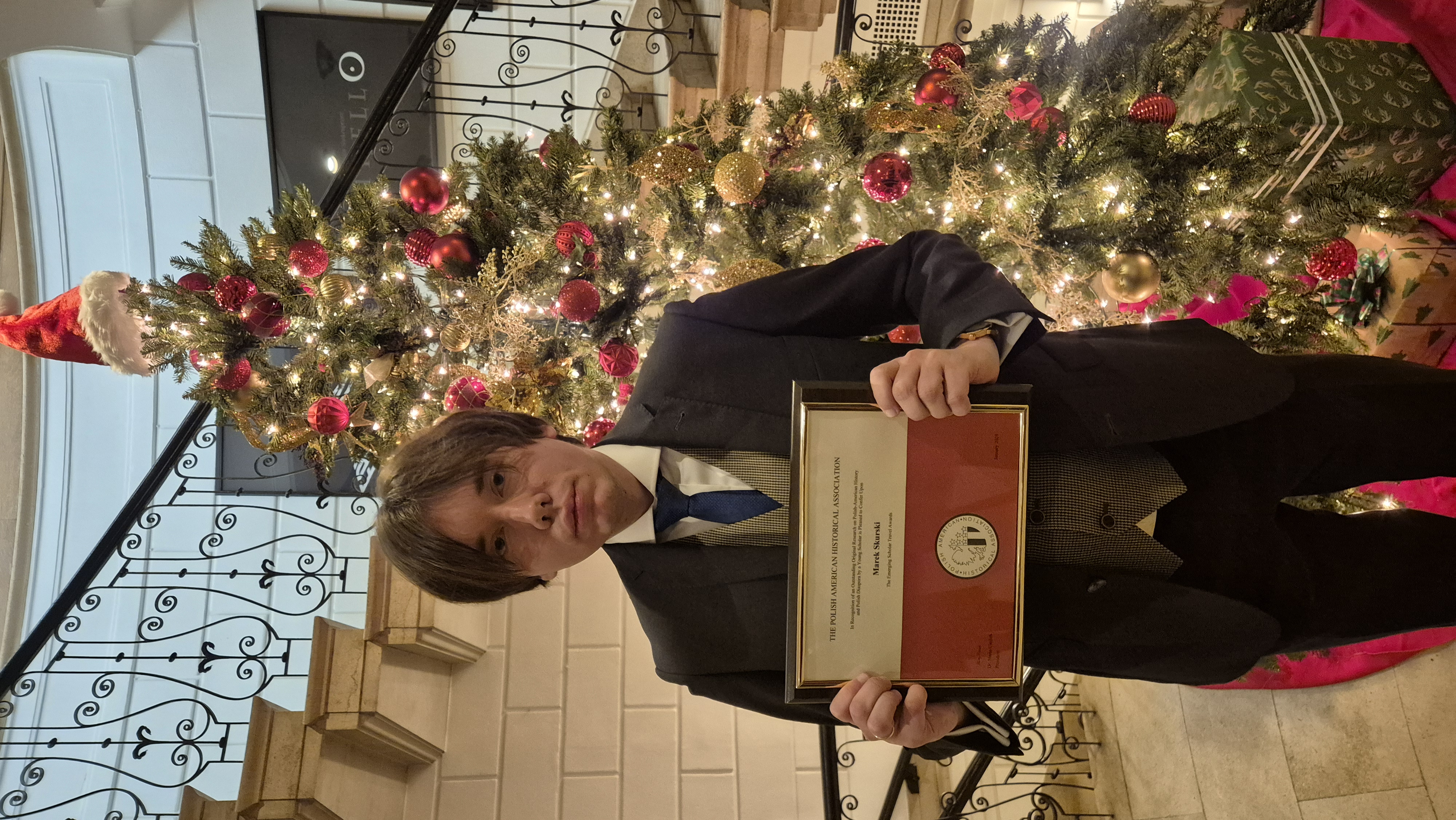to be uploaded
Amicus Poloniae Award Recognizes significant contributions enhancing the knowledge of Polish and/or Polish American heritage by individuals not belonging to the Polish American community
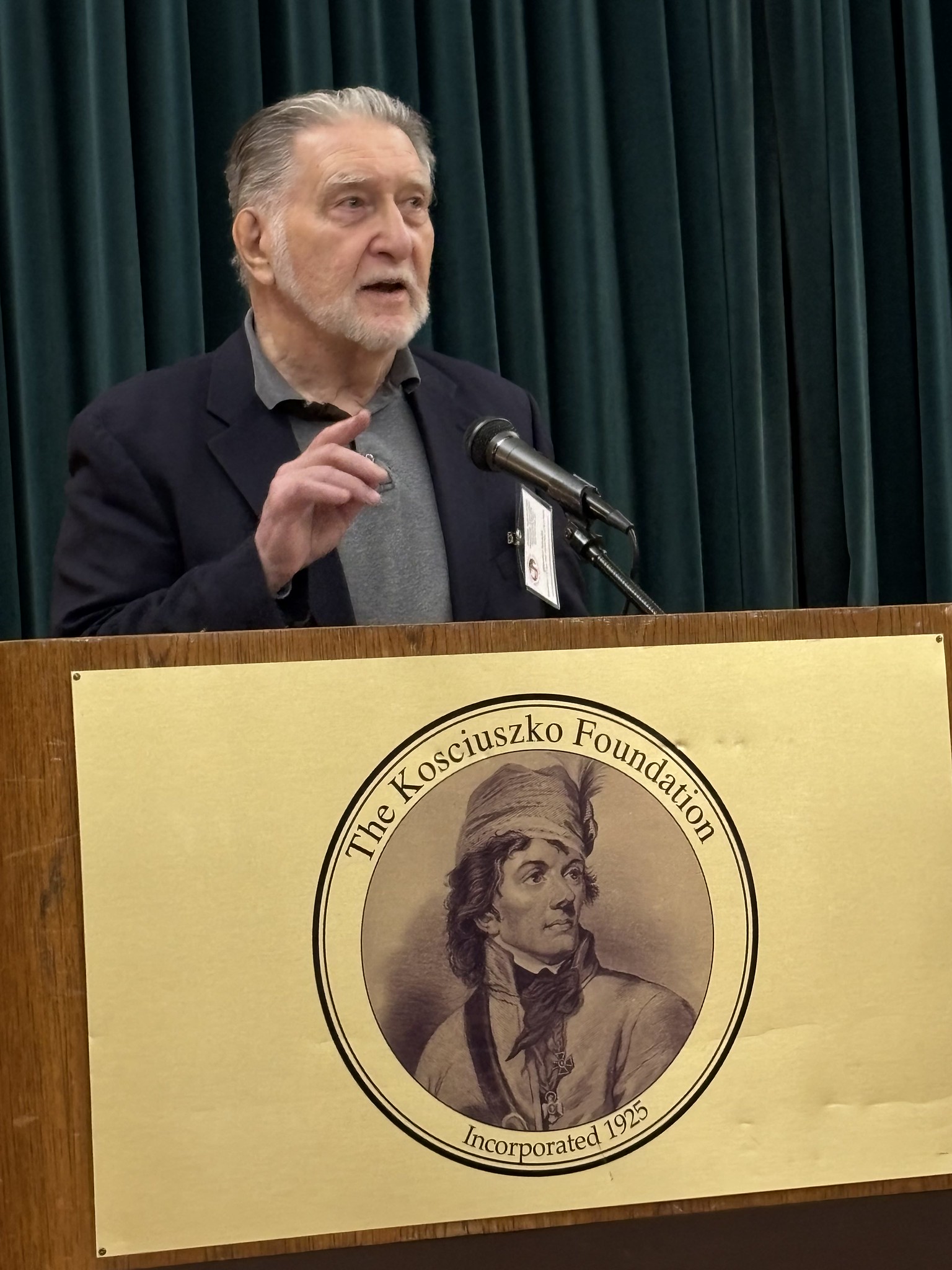
Prof. Jerome Krase, Emeritus Murray Koppelman Professor of Sociology at Brooklyn College of The City University of New York. Krase has been Polish community-adjacent for much of his professional career, although he himself has never identified as Polish. Professor Krase’s scholarly contributions on Polish American topics, in the field of visual sociology and white ethnic studies, have reflected well upon the Polish American community and culture writ large, as well as upon the local communities (like Greenpoint, Brooklyn) that he has studied and documented. Krase has been a pioneer in visual sociology and in the study of ethnic-placemaking and vernacular landscapes. His publications on Polish American topics in these areas are exemplars of the genres:
Jerome Krase, “Polish and Italian Vernacular Landscapes in Brooklyn,” Polish American Studies 54, no. 1 (Spring 1997).
Jerome Krase, “Seeing Greenpoint Virtually and Actually Change: Polish Americans and Gentrification in Brooklyn,” Polish American Studies 76, no. 1 (Spring 2019
Jerome Krase, “Visualizing Ethnic Vernacular Landscapes,” Research in Urban Sociology, Race and Ethnicity in New York City 7 (2004).
Krase’s professional and scholarly accomplishments are extensive and have earned him a glowing national and international reputation. He presently is Co-Editor of Urbanities ( https://www.anthrojournal-urbanities.com ); a member of the Editorial Board of Visual Studies (https://visualsociology.org/journal.html ); and President of the European Academy of Sciences of Ukraine. For a lengthy summary of his c.v., see his Wikipedia entry at https://en.wikipedia.org/wiki/Jerome_Krase .
Mieczyslaw Haiman Award offered to a scholar for sustained contributions to the study of Polish Americans
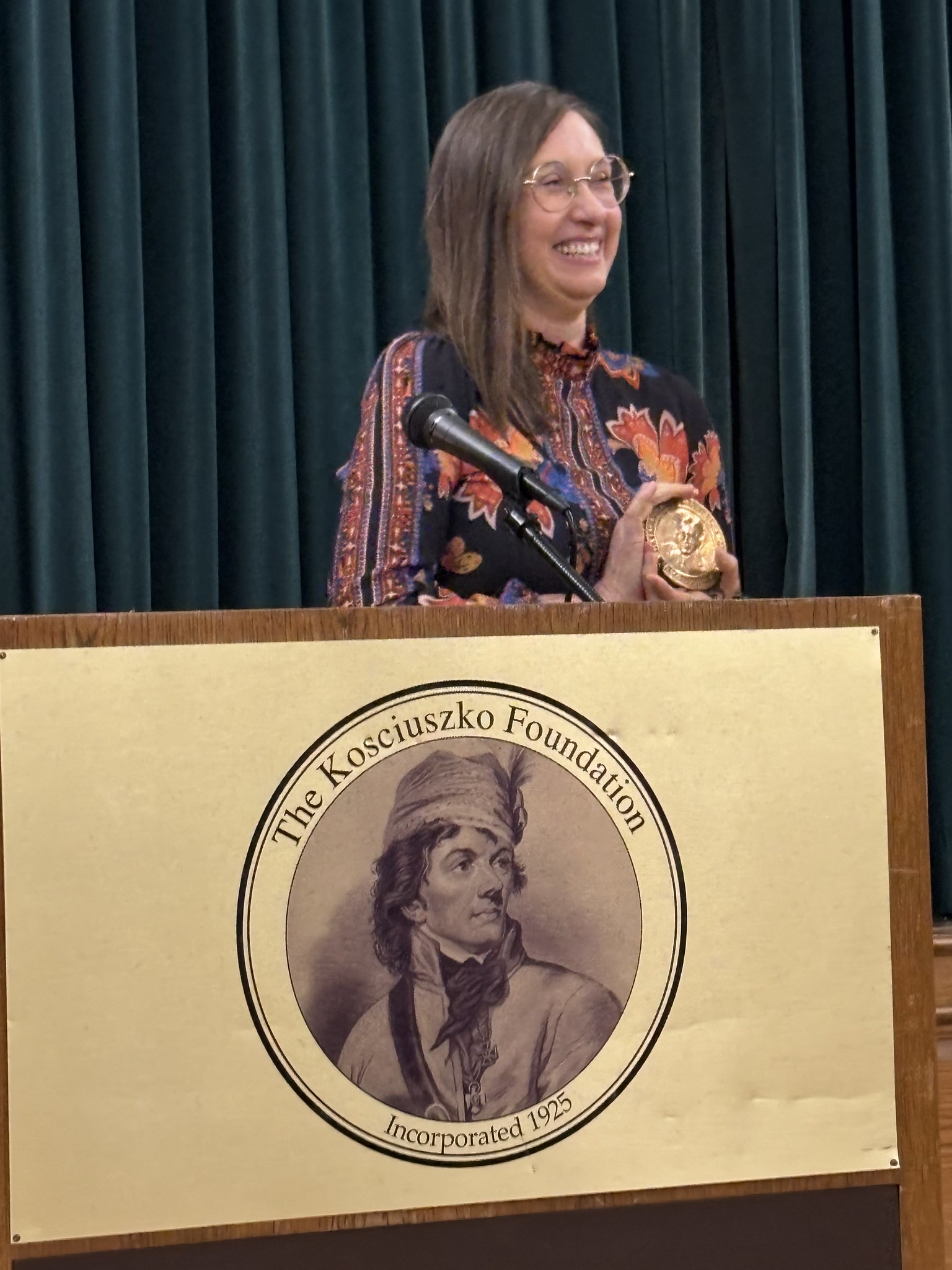
Prof. Anna Müller holds an M.A. from the University of Gdańsk, Poland and a Ph.D. from Indiana University. She is an Associate Professor and the Frank and Mary Padzieski Endowed Professor in Polish/Polish American/Eastern European Studies in the Department of Social Sciences at the University of Michigan-Dearborn.
From 2010 to 2012, she worked as a curator for the Museum of the Second War in Gdańsk, Poland, where she co-curated exhibitions on the Holocaust, concentration camps, forced labor, and eugenics. In 2012, she coordinated an exhibit on contemporary masculinities and femininities in Eastern Europe, titled she, he, me. The exhibit was on display at the Harn Museum of Art in Gainesville, Florida (2012) and the Oloman Café in Hamtramck (2017).
In 2015, thanks to grants from the Polish Ministry of Foreign Affairs and the Research and Sponsored Programs at UMD, she collaborated with photographer Tomasz Zerek and the Emigration Museum in Gdynia on an oral history project in Hamtramck, Michigan, titled The People of Hamtramck, which included a series of interviews with Hamtramck Polonia. The project resulted in two exhibitions -- one in Hamtramck and one in Gdynia, Poland. She has authored and co-authored numerous articles including one about Poles in Hamtramck for which she received PAHA’s Swastek prize in 2023. She is the author of If the Walls Could Speak. Inside a woman’s prison in Communist Poland for which was awarded the Oskar Halecki prize from PIASA. Her latest book is An Ordinary Life? The Journeys of Tonia Lechtman, 1918-1996.
She has displayed leadership in several Polish American organizations and currently is the president of PIASA as well as Secretary of PAHA. Previously, she served as President and then as Treasurer for PAHA
Oscar Halecki Prize recognizes an important book on the Polish experience in the United States.
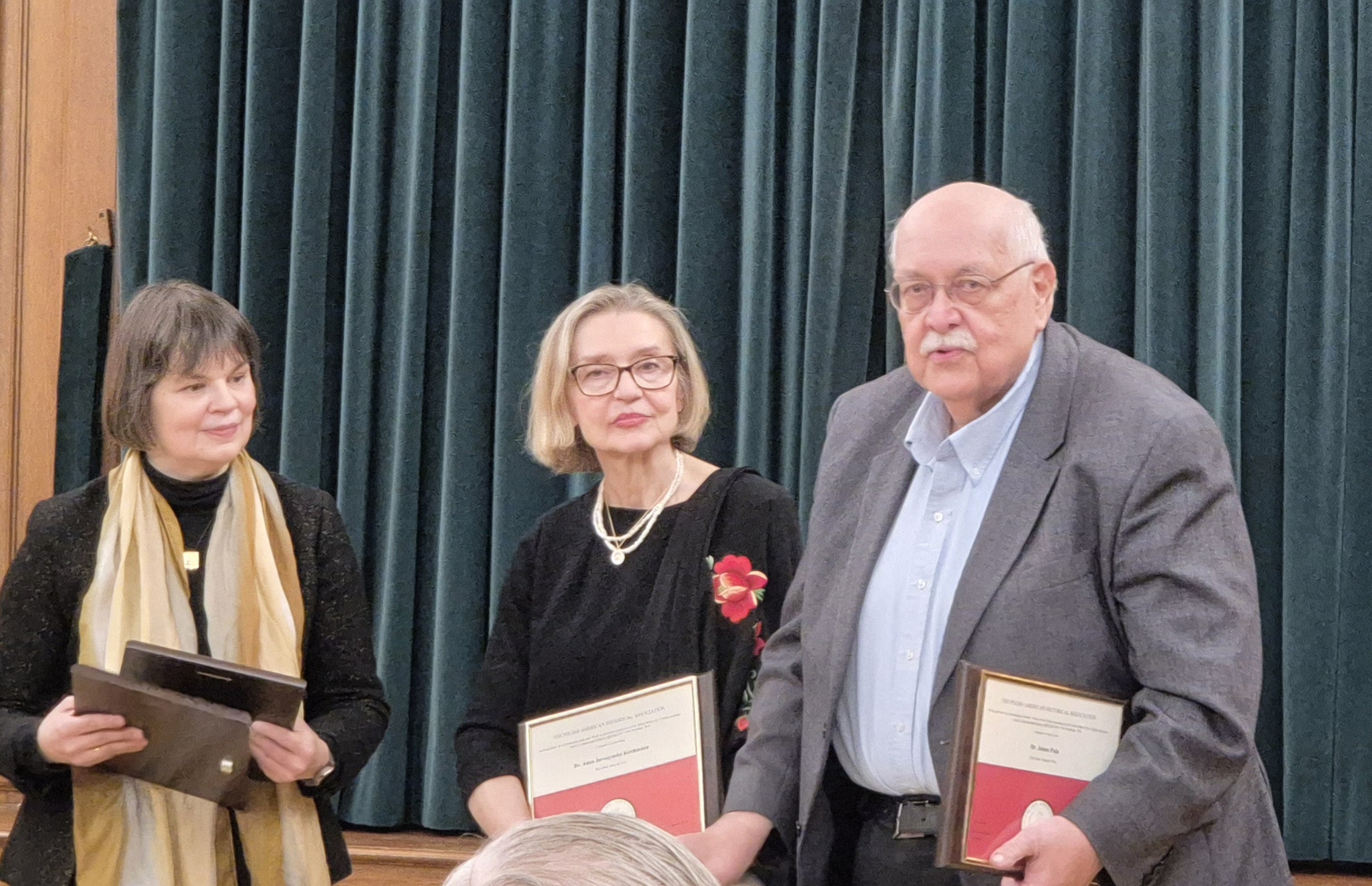
Polish American History before 1939: Polish American History from 1854 to 2004, Volume 1 and 2(New York: Routledge, 1923 (vol 1), 1924 (vol 2) and Polish American Voices: a Documentary History 1608-2020 (New York: Routledge, 1924)
The four authors recognized for the prize are: Adam Walaszek, Joanna Wojdon, Anna Jaroszynska Kirchmann and James Pula.
An outstanding three-part, multi-authored study of Polish American history presenting the history from the beginning of Polish presence on the content to the present. The four authors of these volumes were supported by the same grant and worked collaboratively to produce this outstanding overview of Polish American history hence the joint recognition. The three volumes are published by Routledge as part of their Routledge Advances in American History.
Polish American History before 1939: Polish American History from 1854 to 2004, Volume 1 by Adam Walaszek (New York: Routledge, 2023; translated by Urszula Tempska). This volume documents the history of private lives of the first and second generations of Polish immigrants in the United States is viewed from the perspective of migrants themselves. It discusses migration processes, the formation of neighborhoods, experiences at work, daily and family lives, parish operations and functions and related tensions, as well as the construction of people's identities and their constant reformulations. The monograph ends in the year 1939, when after the Great Depression, the group entered a new period of transformation during the war.
Polish American History from 1854 to 2004, Volume 2 by Joanna Wojdon (New York: Routledge, 1924) This volume picks up with the next wave of Polish immigrants after World War II and tells their story through interviews, documents, organizations, and their interactions with previous Polish American groups. These topics are shown against a broad historical background of developments in Poland, the United States and other locations of the Polish Diaspora. It depicts Polish Americans’ transition from a ‘minority’ through an ‘ethnic’ group stage to “becoming” Americans who take pride in their symbolic ethnicity, maintained intentionally and manifested occasionally. The focus is also on the activities of individuals of Polish heritage who saw themselves as part of US but still maintained ties to their Polish ethnicity rather than trying to brush away all of Polonia as a monolithic group.
Polish American Voices: a Documentary History 1608-2020 edited by Anna Jaroszynska Kirchmann and James Pula (New York: Routledge, 1924) presents 145 primary source documents of Polish immigrants covering the period of the previous two volumes. These documents speak about their lives, concerns, and viewpoints on the issues of identity as they strive to make sense of their lives in the context of migration. The volume has 10 chapters with introductions and an extensive “Further Reading” section that includes interviews, autobiographical fiction, organizational papers as well as visual sources.
These three well researched volumes will provide students and scholars with a broad understanding and an incentive for future study of the Polish experience in the US, including social and cultural history.
James S. Pula Distinguished Service Award This award is given to a member of PAHA who has rendered valuable and sustained service to the organization.
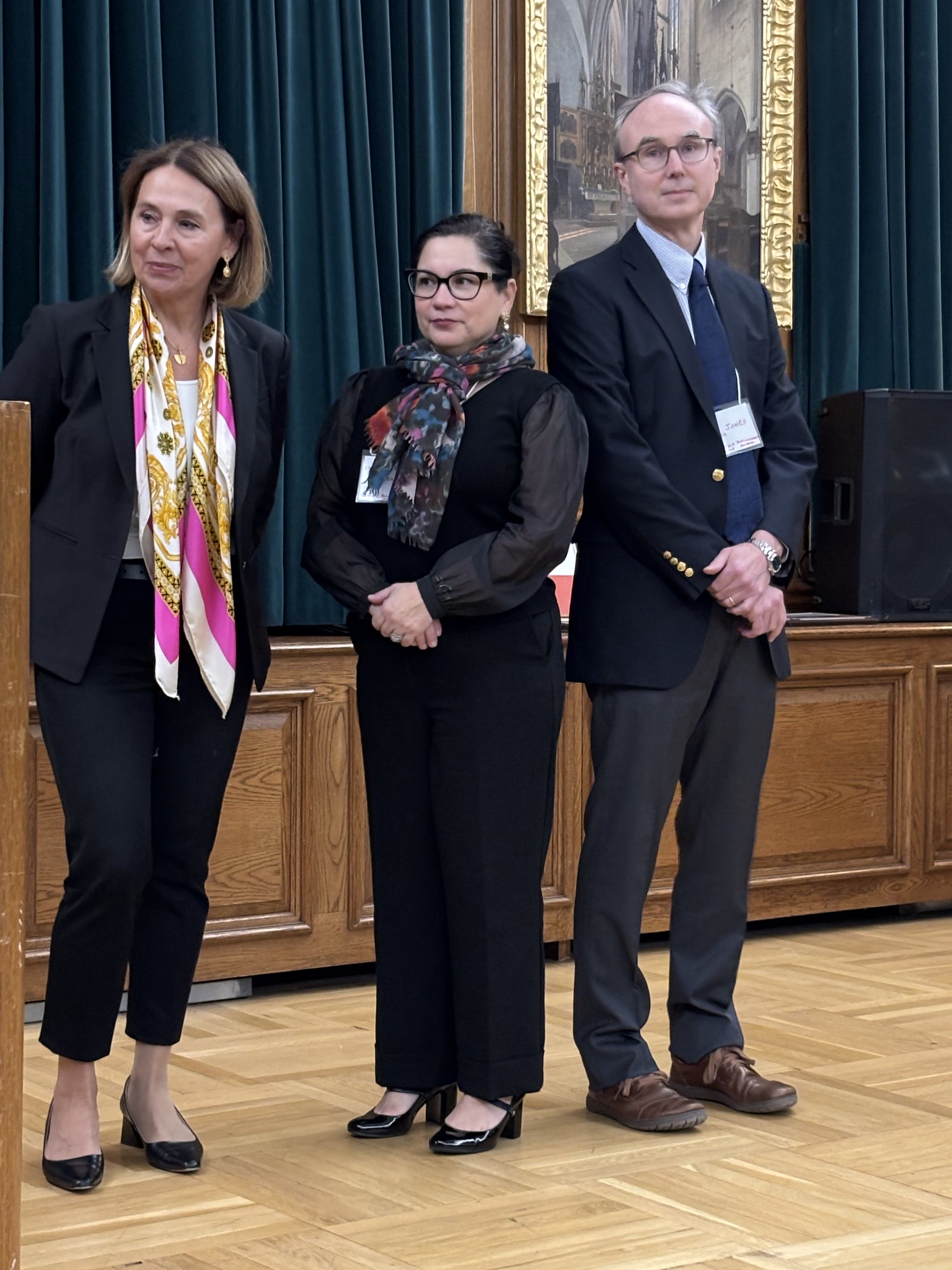
Central Connecticut State University In recognition for 20 years of support to PAHA which has enabled our organization to grow as an interdisciplinary academic and professional organization with a diverse, international membership of individuals and institutions. in 2004, PAHA was fortunate to find a permanent home at Central Connecticut State College in New Britain, Connecticut, under the sponsorship of the CCSU Polish Studies Program and the Polish Chair there (named after the late CCSU professor and past PAHA president Stanislaus A. Blejwas). Since then, CCSU has provided library space for our organizational archives, and time of support staff to help with our conferences as well venues for lectures sponsored by the Polish Studies Program. This arrangement has fostered PAHA’s development, numerous researchers both stateside and from Poland to do research in the archives as well as benefitting the local Polish community who utilize the collections and attend lectures and seminars. We look forward to continuing this mutually beneficial arrangement.
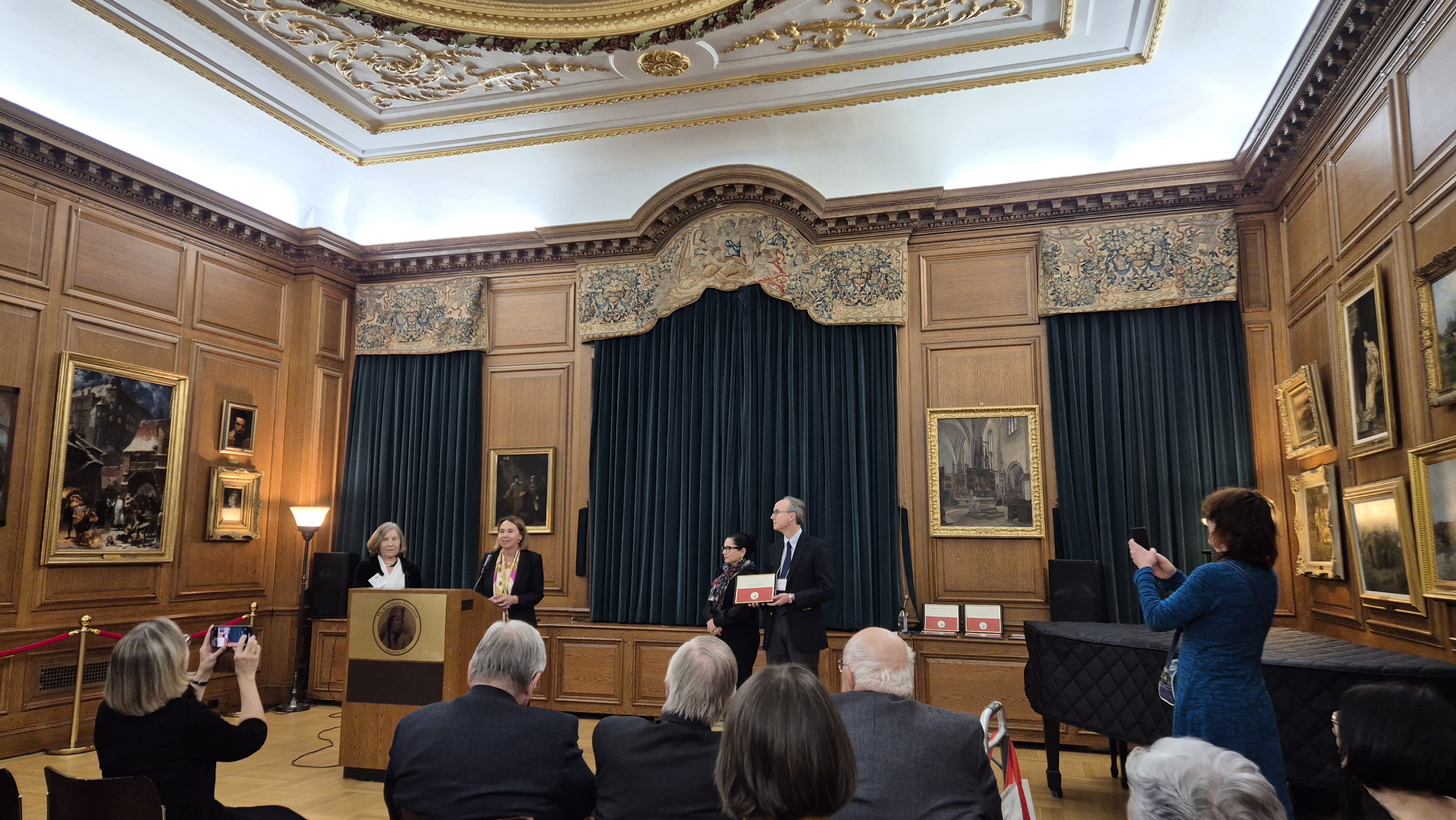
Skalny Civic Achievement Award honors individuals or groups who advance PAHA’s goals of promoting research and awareness of the Polish American Experience.
Marek Skulimowski, President of The Kosciuszko Foundation since 2016, is an experienced diplomat, businessman and philanthropist. He previously served as Deputy Consul General of the Republic of Poland in New York and as Political Counselor at the Embassy of Poland in Tel Aviv, Israel. He successfully led a program of recovering Polish art looted by Nazi Germany during World War II. Skulimowski was in Poland, his homeland, in the early days of Russia’s full-scale invasion of Ukraine and he immediately became actively involved in helping Ukrainians help at the border, where hundreds of thousands of Ukrainian refugees were crossing. He quickly set up an immensely successful fundraising campaign to assist the migrants. Together with the Smithsonian Institution and the Polish Foundation Folkowisko, he engaged the Kosciuszko Foundation to join forces to help protect and preserve Ukrainian cultural heritage artifacts and to prevent their destruction during the Russia-Ukraine war. Many of the art pieces, particularly in Lviv, have been evacuated and are stored in safer locations.
Skulimowski has provided outstanding leadership in expanding the foundation with a rich array of cultural events such as author evenings lectures, concerts. Since its founding in 1925, the KF has been promoting closer ties between Poland and the US through educational, scientific and cultural exchanges. It awards over $1 million annually in fellowships and grants to graduate students, scholars, scientists, professionals, and artists, and promotes Polish culture in America. Their headquarters in NYC houses an extensive library, archive and an art gallery and also has chapters thorough the country including Denver, Texas, Michigan, Ohio, Florida, Washington DC. We wish Marek Skulimowski and The Kosciuszko Foundation sto lat on their 100th anniversary!
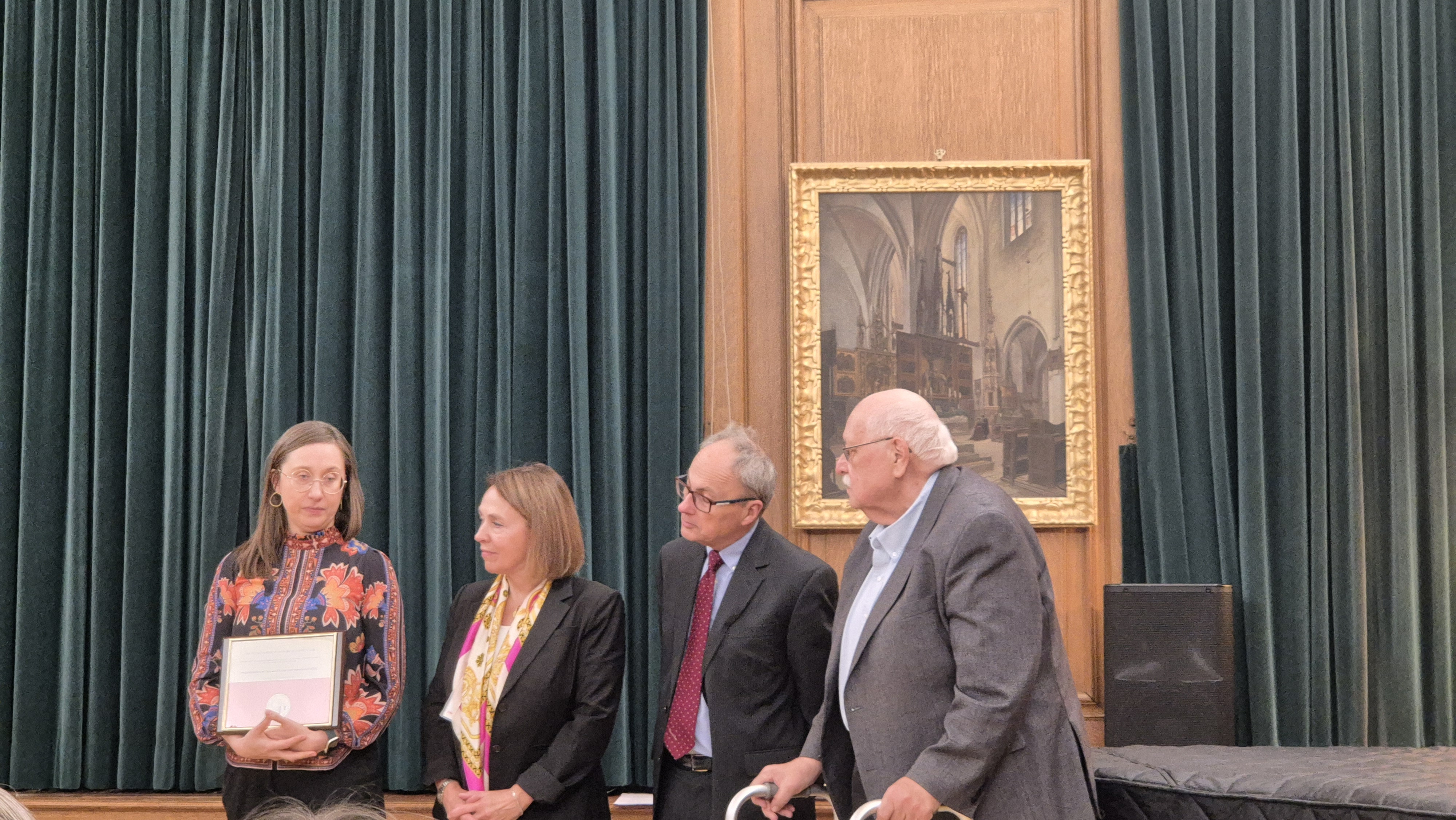
PIASA Polish Institute of Arts and Sciences of America PIASA was founded in 1942 by a group of Polish scholars, who came to the US after the outbreak of World War II to assure the continuity of Polish culture and learning and preserve Polish scholarship and culture for future generations. It continues to serve as a center of learning devoted to the advancement of knowledge about Poland and Polish Americans through lectures, symposia and publications. Since 1956 PIASA has published a quarterly journal, The Polish Review, which includes articles both by Polish scholars and foreign researchers, on Poland. The Polish Review has become an important English-language journal in the world of science, and the only academic journal in North America devoted exclusively to Polish and Polonia issues. From the time of its establishment, PIASA endeavored to collect and create an extensive research library and archives and special collections. These holdings include manuscripts, correspondence, photography, diaries of prominent Polish politicians, scholars and artists. PIASA’s Alfred Jurzykowski Library has a scientific character, which makes it an important research center for Polish and Polish American studies for researchers from Poland and the United States alike. It is worth mentioning that PAHA was initially a section of PIASA when founded until PAHA autonomous is 1948.
Nowy Dziennik is a Polish language weekly published in Clark NJ in Polish since 1971 but also has national distribution in both paper and online. Initially a daily, then published in New York City once a week, Nowy Dziennik was founded in 1971 by Bolesław Wierzbiański (1913 – 2003), the journalist and first editor-in-chief. Over time, the paper has developed into the biggest and most respectable Polish daily in the United States. It is edited for the Polish diaspora. Nowy Dziennik covers all issues of interest to Polish emigration, including current events in Poland and abroad, investigative journalism, comprehensive reports, political commentary, and cultural events. Coverage on the open dissident movement in Poland, the pontificate of John Paul II, and martial law were the prelude to transforming Nowy Dziennik from just another foreign-language newspaper into a publication with great breadth and intellectual depth. “Its 50-year history is a series of transformations, adapting to the expectations of readers and the demands of the times. A few years ago, Nowy Dziennik transitioned from a daily newspaper to a weekly. The current editor-in-chief is Jolanta Wysocka, and the publisher is Zygmunt Rygiel.
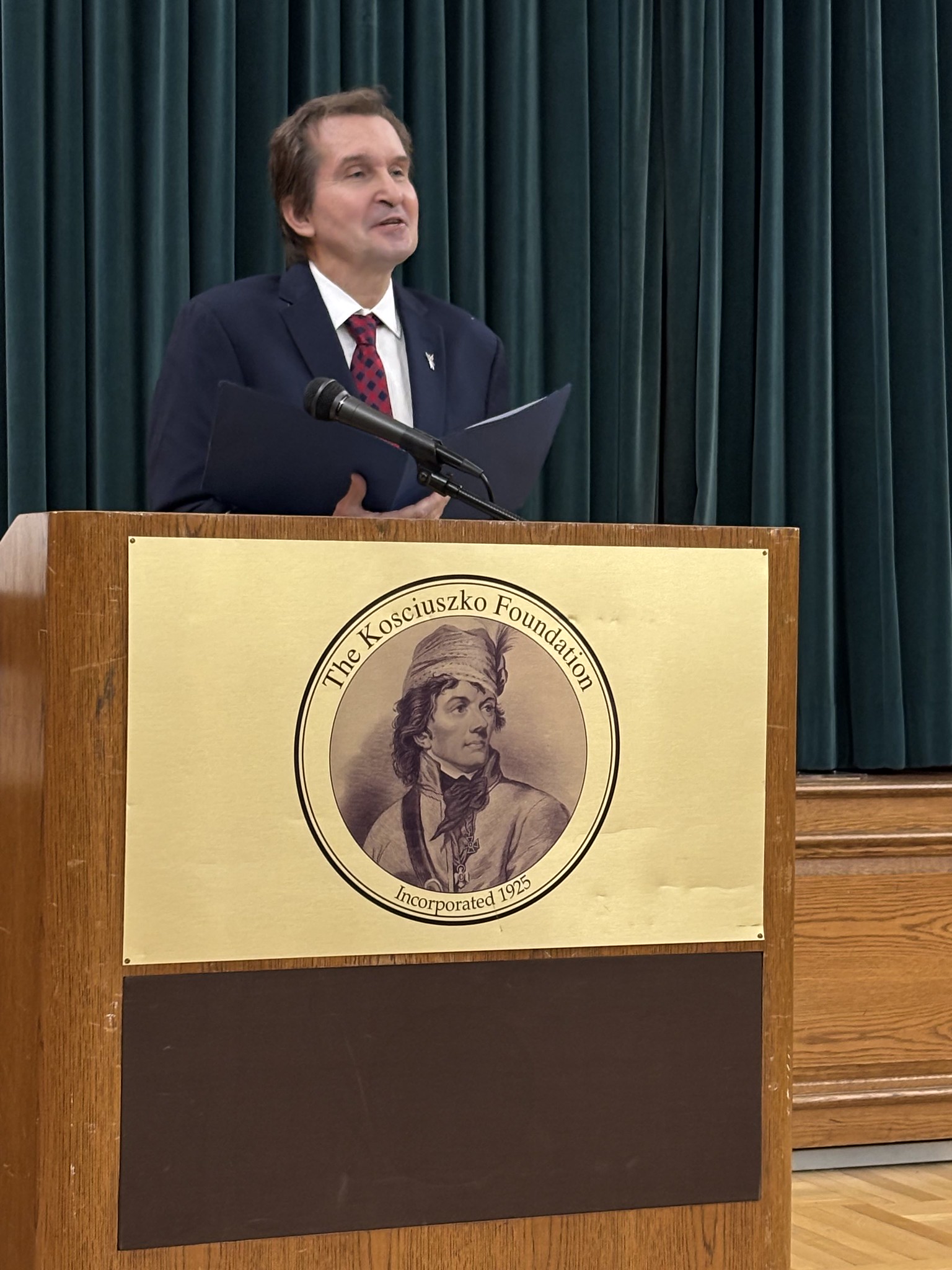
Receiving the award on behalf of the Polish American Journal: Staś Kmieć
Polish American Journal is a bi-monthly English language national paper that covers events in Polonia and across the US. It is published near Buffalo. The PAJ is the nation's largest, independent English language newspaper dedicated to the promotion, preservation and continuance of Polish American culture. Since its founding in 1911, Polish American political, religious, fraternal, social and entertainment leaders have staffed the newspaper. In 1948, the paper became the first Polish American weekly to be printed entirely in the English language. Later, it underwent several name changes and mergers. The entire paper is now written, composed and edited by writers and staff in locations throughout the United States and Poland. Since its founding, the Polish American Journal has been dedicated to the promotion and continuation of Polish American culture in the United States, a heritage rich in the joys of the family, church and country. It helps with organizing and supporting special events, networking, and providing consultation to individuals and groups, which seek to learn more about the Polish community in the United States as well as supporting scholarships. The current editor-in-chief is Mark Kohan.
Creative Arts Prize recognizes the contributions in the field of creative arts by individuals or groups who have promoted an awareness of the Polish experience in the Americas.
The Sembrich
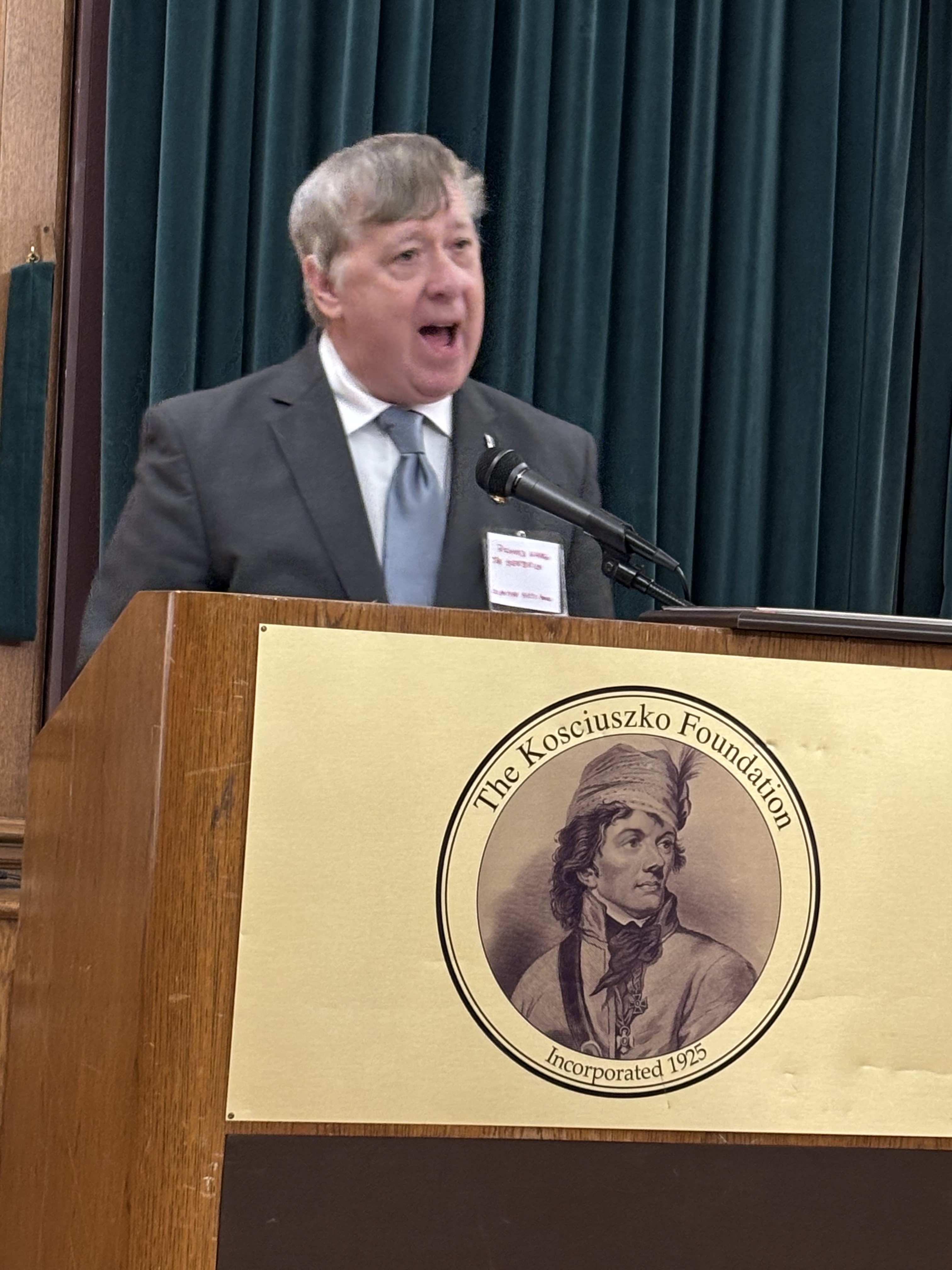
Receiving the award: Richard Wargo
The Sembrich is in Bolton Landing NY on Lake George and was the lakeside home and studio of the internationally renowned Polish Soprano Marcella Sembrich (1858-1935). The unique museum collection highlights Sembrich’s distinguished operatic career, achievements and musical legacy through an extensive costume, artifact and music collection. The Sembrich also offers a variety of programs, articles, lectures, films, and multi-media presentations online as well as hosting musical performances in her teaching studios. In 2024, The Sembrich celebrated 100 years of Marcella Sembrich’s musical legacy with an impressive line-up of acclaimed concert artists and featured works by composers in Sembrich’s own artistic circle. The museum and grounds have been open to the public since 1937. Marcella Sembrich was a great Polish patriot throughout her life. During World War One she was President of the American-Polish Relief Committee of New York. “The Sembrich Collection is perhaps the finest surviving example of the grandeur of opera in the late nineteenth and early twentieth centuries.” — Robert Tuggle, former Director of Archives at The Metropolitan Opera, New York The Sembrich: Music, History & Nature on Lake George
THE SWASTEK PRIZE Awarded for the best article in the 2023 volume of Polish American Studies
The Editorial Board of Polish American Studies have voted to award the Swastek Prize for 2003 to James S. Pula for his article "The Causes and Characteristics of Polish Immigration to the United States: A Review of Research," Polish American Studies 80, no. 1 (Spring 2023): 17-43.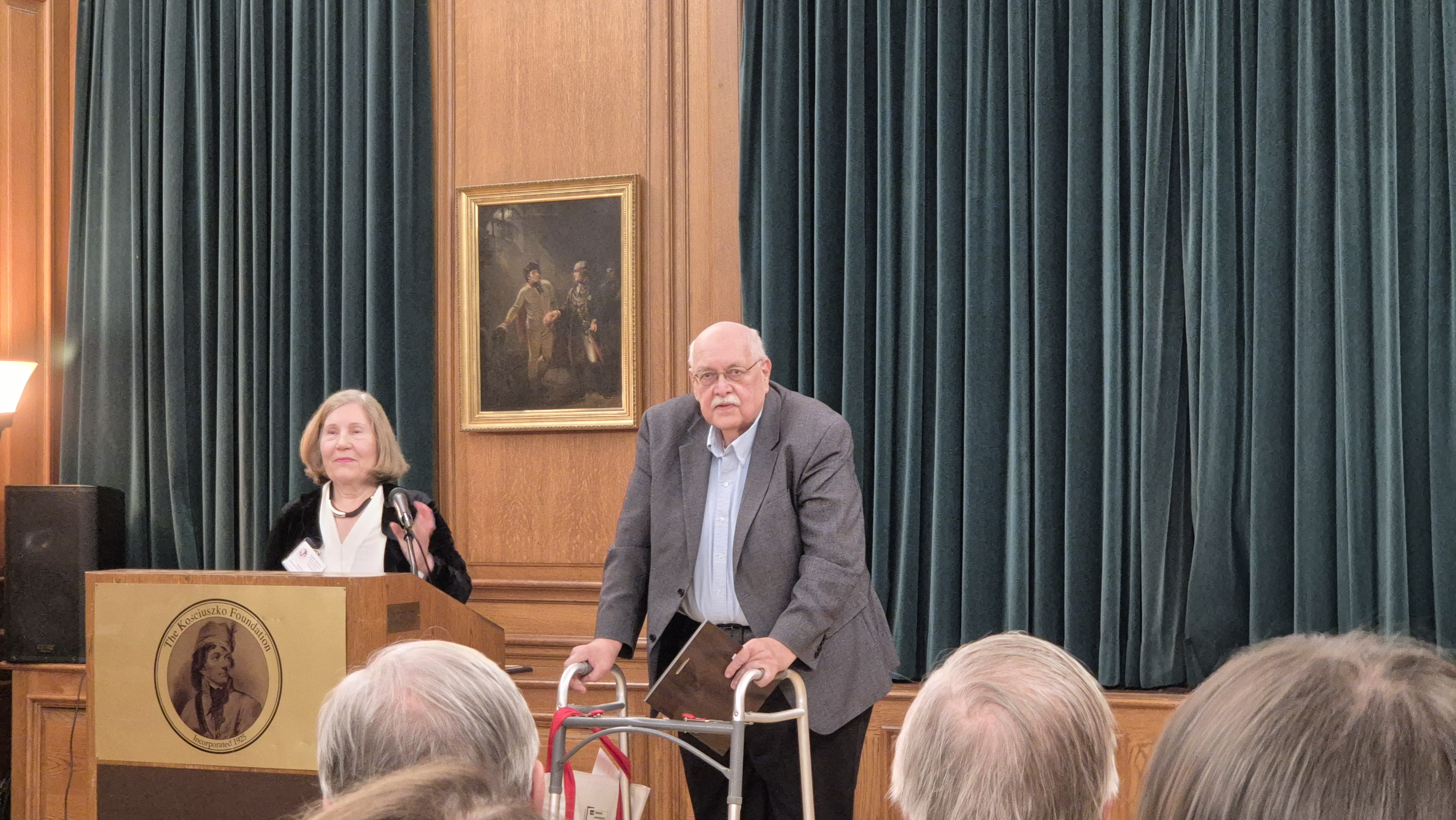
As some of the board members commented, Pula's article is an authoritative, comprehensive, and clearly written overview of the history of Polish migration to the United States. The author has succeeded in building a coherent narrative while statistical data gives a sense of scope and scale of the process of Polonia’s formation but does not overwhelm the story. This study has potential to become a foundation for future research and to supersede the earlier similar attempts, now badly outdated.
Emerging Scholar Travel Awards
Marek Skurski
He is in his third year of his PhD at Doctoral School of Humanities and Social Sciences, University of Gdańsk, under Prof Anna Mazurkiewicz. He already has published a half dozen articles and presented at numerous conferences. His academic interests include history of late modern and contemporary Japan, Cold War history, intellectual history. He has received an award for the best Master’s thesis written in the Institute of History, University of Gdańsk and 2020-2022 – University of Gdańsk Rector’s scholarship for outstanding students. Since February 2022 he has been a part-time employment at Samurai Labs as an annotator in the cyberbullying prevention project (in English). His advisor writes that “Marek Skurski who is fluent in both English and Japanese decided to unveil this chapter in [Jerzy] Lerski’s life and thus fill in a big gap in Polish and Polish-American historiography” His presentation at the NY PAHA conference will cover this topic: PAHA’s past president Jerzy Lerski in Japan(1951-58): The Untold Story.
